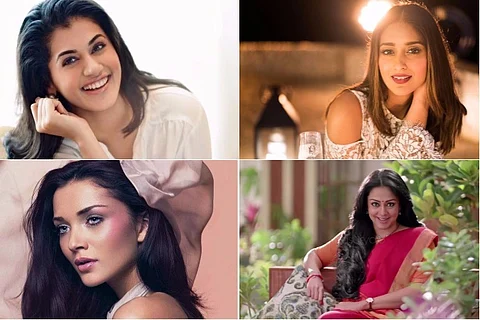

When Taapsee Pannu recently called out director K Raghavendra Rao and other filmmakers in the south Indian film industries for their obsession with a woman's midriff, she was faced with an immediate backlash. However, other actors in Tollywood like Ileana D'Cruz and Amy Jackson have spoken out in her support.
Speaking to DNA, actor Ileana recalled that she was just 18 when she made her debut with YVS Chowdary, who looks up to Raghavendra as his guru. In her first film, she said, a heavy porcelain shell was dropped on her stomach.
"My ab muscles hurt so much. I was 18 then and I had no idea what I was doing and why it is considered sexy. There would be so many shots and close-ups so often. It’s been 11 years, and I still don’t understand what goes into filmmaking at all. I am comfortable having people tell me what to do. As far as the flowers, coconuts, and all are concerned, it’s horrible," the actor said.
Calling the tradition "horrible", Ileana said that the only benefit it had was to make her feel better about her "big hips".
Amy Jackson, too, pitched in, calling on filmmakers to stop the practice. She said that she'd never gone through such an experience, and that she wouldn't allow anyone to do something like this to her either.
"Because if someone did that to me, I will throw the coconut right back at them," said the actor.
Predictably, just as in the case of Taapsee who faced a backlash from the Telugu industry and fans for being "disrespectful", these women also are being asked why they signed up to do "revealing" scenes in the first place. Taapsee later issued an apology for "hurting" sentiments although nothing she said about the director or his portrayal of women was untrue and nobody had said that it was either.
Certain entertainment sites have focused on "vulgar" scenes these actors consensually appeared in, while reporting on their objection to how women are depicted on screen.
Previously too, when actor Jyothika spoke about misogyny in the film industry at the audio launch of her upcoming film Magalir Mattum, there were many who criticised her for being a "hypocrite".
Jyothika had spoken frankly at the launch, asking directors to give women dignity in their films, calling out the way women are infantilised on screen and the manner in which a ‘hero’ is often surrounded by three or four heroines to make him look good.
To many, however, her speech was only a PR exercise. Jyothika had indeed appeared mostly in mainstream, "mass" films that were guilty of the criticism she doled out, when she was at the peak of her career; she's also married to one of the top stars in the Tamil industry, actor Suriya, and his films are not free of such misogynistic depictions either.
It's true that nobody is in the film business for charity and all these women who are now speaking up have made big money playing the roles that they did. However, it's unfair to dismiss their voices as "hypocrisy".
In the male-dominant industry, heroines are usually considered replaceable unless they've worked themselves to a position of stardom. Since most films are made by men and tell the stories of men, women actors barely have anything substantial to do in the film. When script after script expects them to do the same "glamour" scenes, there aren't too many options to pick from either.
The shelf life of a heroine is also considered to be very short and it's only a few south Indian woman actors like Trisha, Nayanthara, and Anushka Shetty who've managed to hold their ground despite crossing the age of 30 years.
All of these factors often make it very difficult for an actor to be choosy about the films she does.
Many of them, if they choose to speak out at all about the sexual harassment and exploitation that they face in the industry, do so towards the fag end of their careers or once they've hung up the high heels. They are well aware that if they speak out before against the powerful men who control the industries, it will be near impossible for them to survive.
However, with the growing discourse on gender equality and violence against women in the country, there are more and more women from the industry willing to speak up about the issue.
Judging them for not speaking up earlier and ignoring the very real and valid concerns that they raise will not only preserve the status quo but also discourage more women from coming forward.
If misogyny in cinema needs to change, the people who control cinema and consume it, need to change as well. And that's not going to happen if we kill the messengers for their past.